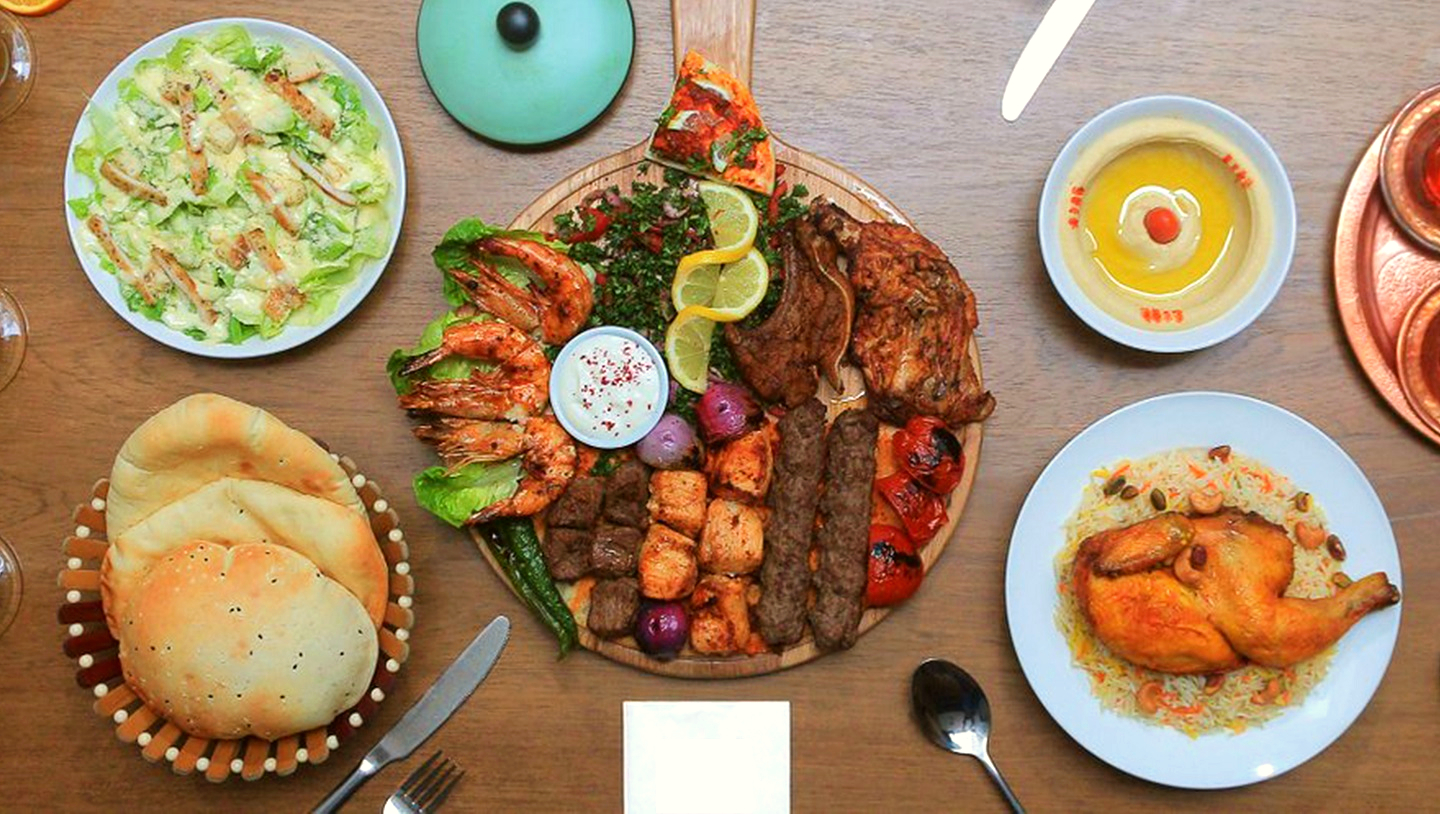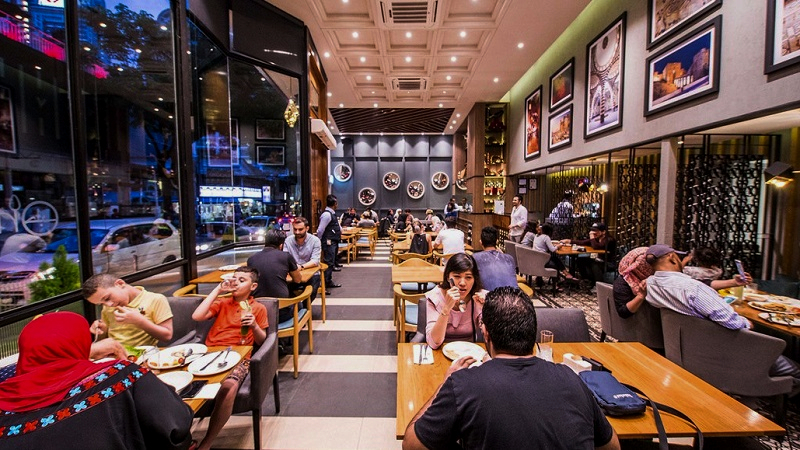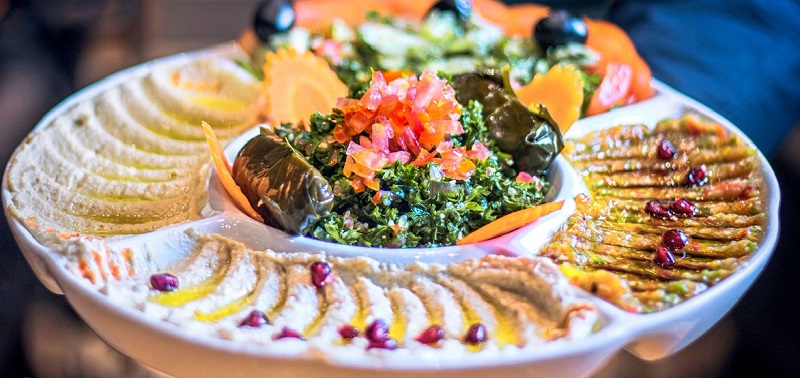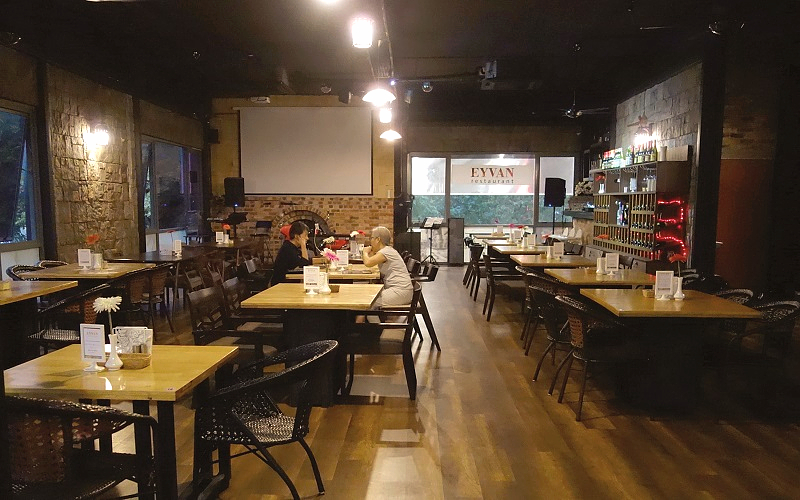
Halab Restaurant offers an assortment of Middle Eastern dishes with Syrian flavours (Photo: Halab Restaurant)
Halab Restaurant
Halab, the old name for Aleppo, Syria, provides a clue to the cuisine of the namesake restaurant. Run by Syrians, with Syrian cooks, it offers an assortment of Middle Eastern dishes with Syrian accents. The restaurant is fairly bustling, with a bright, modern interior, brisk, friendly service and Middle Eastern features, from the piped music and arabesque patterns on the floor, to framed pictures of the ancient city on the walls.
A glass partition provides a view of the kitchen, with a charcoal grill, a vertical shawarma rotisserie and friendly cooks preparing food.

Mixed appetisers (RM40), featuring Babaghanoush, muhammarah (Aleppo hot pepper dip), hummus and moutabal with bread, set the mood. My favourite was the vivacious muhammarah, a medley of smooth, smoky and familiar yet exotic cold dips, with ground chickpeas, eggplants, spices and olive oil.
In short order, the table was cluttered with other dishes. The Grilled Fish (sea bass, RM45) was grilled to crisp, smoky perfection while remaining fresh, moist and tender. The Chicken Maklouba (RM25) was a triumph of tender chicken served on a heaping bed of fragrant, appetising rice and grilled eggplants, with a chilli-tomato sauce and yogurt on the side.
The Kibbeh Labanieh (RM28), an Aleppo speciality, gave me pause — spiced minced lamb in balls of bulgur wheat served in hot yogurt were offset by fresh-cut raw vegetables. It is not to everyone’s taste, especially if one is not partial to strong tasting lamb, but it is certainly an exotic speciality to try.

Of special mention is the Shami Zhworat (RM15 for a teapot, serves two), a gold-coloured flower herbal infusion with a flowery flavour that was surprisingly full-bodied and had a wonderfully calming effect that complemented and rounded off the meal.
Halab’s portions are generous and its prices reasonable. Its setting, bustling atmosphere, background music and the authenticity of the food might transport you, for a short while, to the friendly, noisy ambiance of an Arabic city. The dinner left me with a pang of regret and nostalgia. I was in Syria many years ago and was reminded of what it once was, and now is.
Eyvan Restaurant
At Eyvan, there is a broad terrace leading to a spacious, rather gloomy wood-floored interior with a drinks cabinet, bar area to one side, and tables and chairs arranged in a row. There is also seating outside, where the shisha pipes are. The restaurant tries to be a little of everything, with pizzas, pastas, steaks, sandwiches, Arabic dishes and even a misplaced nasi goreng, but the place is owned and managed by Iranians, with an Iranian cook, so ordering was not difficult.
The action starts after 10pm, with a live Iranian band performing in the corner and a belly dancer to liven things up until the wee hours of the morning. Iranians eat late, hanging out while smoking shisha pipes and enjoying live music — the same scene you would find in other Iranian-speciality restaurants, such as Solaris’ Shisha Lounge.

The food arrived quickly, first the Shirazi Salad (RM12) of cubed tomatoes, cucumbers and onions with mint and lemon juice, followed by the Barley Soup (RM10), which is ubiquitous in Iran, with shredded chicken in a thick barley-chicken broth that tasted authentic. It was the ruby-red barberries on the Tahchin (RM23) — blossomed saffron rice with yogurt and egg, cooked with a burnt crust — that established the kitchen’s credibility, barberries being an essential ingredient of Tahchin. The rice was fluffy, yellow and fragrant, with well-cooked chicken and lamb, and a convincingly browned crust.
The khoresh stews arrived with heaping plates of long-grained Iranian, steamed buttered rice. The Ghormeh Sabzi (RM22) had an exotic, dusky, distinctive flavour of minced herbs and fenugreek leaves, accented by tart pickled limes with meaty lamb and beans in the dark green mix, while Gheymeh Bademjan (RM24) was more familiar, being a tomato-based stew with peas, lamb and chunky eggplant, highlighted by the tartness of the pickled limes.

The manager kindly provided complimentary desserts of the off-menu Bastani Sonnati — cheesy-textured ice cream with rose water flavour — and the cold Faloodeh, which is sweetened vermicelli, but I have never found Iranian desserts appealing.
Eyvan serves up authentic Iranian food and — if you are prepared for a late dinner — the atmosphere and music to go with it. A place to keep in mind for Nowruz, the Persian New Year.
Halab Restaurant (Bukit Bintang Branch), 35, Jalan Berangan, Bukit Bintang, KL. 03 2110 4146. Daily, 11am-4am.
Eyvan Restaurant, A-2-7, Block A, Ativo Plaza, Bandar Sri Damansara, KL. 03 6262 0199. Daily, 11am-1am.
This article first appeared on Feb 18, 2019 in The Edge Malaysia.


